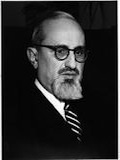Rabbi Joseph B. Soloveitchik (1903-1993), longtime head of Yeshiva University’s rabbinical school and the preeminent figure in shaping of Modern Orthodox Judaism, was one of the 400 rabbis who marched to the White House in 1943 to plead for rescue of European Jewry.
Although his participation is not mentioned in contemporaneous sources, Rabbi Soloveitchik mentioned the march in a lecture that was included in Divrei Hashkafa, a 1992 collection of his teachings, edited by Moshe Krone. There the rabbi said that he “could not forget” the day “when the Agudas HaRabbonim [Union of Orthodox Rabbis] brought to Washington some five hundred rabbis, who asked to be received by President Roosevelt in order to express their anguish and propose concrete steps for rescue. I too was among this large rabbinic group that arrived at the White House just before Yom Kippur. We were not received by the president.”
In a taped lecture at Yeshiva University’s Wurzweiler School of Social Work in New York City on December 24, 1973, Rabbi Soloveitchik remarked that “during the Holocaust period,” many American Jews were not sufficiently concerned “with our brethren, with our fellow Jews, and we let millions of Jews go down the drain.” Therefore, he said, “to the list of Al Chets of the chatayim [sins] we enumerate on Yom Kippur, we should add another Al Chet. Perhaps it would be the worst, the most horrible one–Al chet shechatanu lefanecha bera’inu tzoras nafshoseihem shel acheinu bais Yisroel shehischananu eileinu v’lo shamanu [‘For the sin that we have sinned before You by seeing the suffering of our Jewish brethren who called to us and we did not listen’].”
Sources: Lookstein, “Rabbi Joseph Soloveitchik,” pp.457-460.








